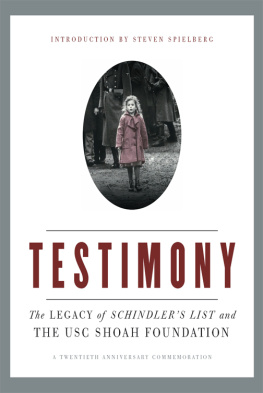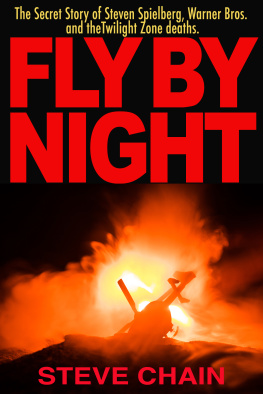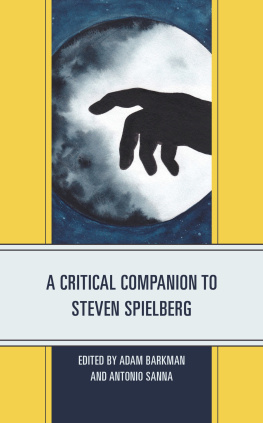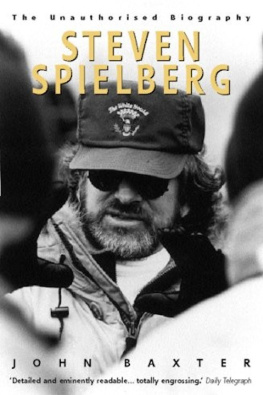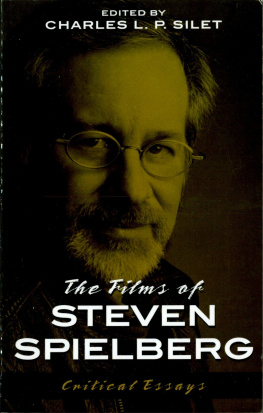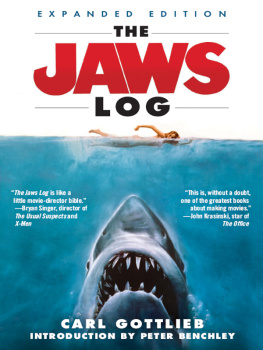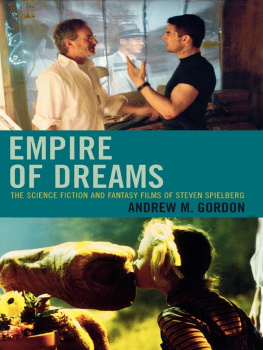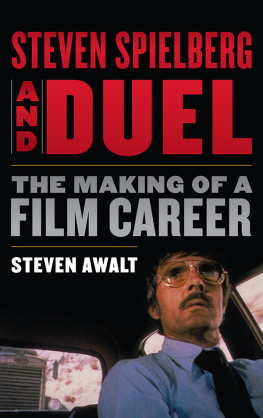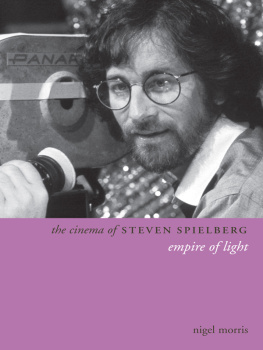1
The Man Who Fell to Earth
Yesterday, upon the stair,
I met a man who wasnt there.
He wasnt there again today.
I wish that man would go away.
Traditional rhyme
T HE FORCE of American popular art lies in its directness, its simplicity, its economy of means and of scale. Analysis may uncover cultural and autobiographical references, sophistications of technique, even profundity of intellect, but the first appeal of a George Gershwin song, a Walt Disney cartoon, a Norman Rockwell painting is, and must be, commonplace delight.
Steven Spielberg embodies this tradition. His films, even the sombre Schindlers List, are machines for delighting us. Almost always they succeed in doing so. Its not hard to see why. He traffics in what authors of science fiction, his preferred form, call a sense of wonder, a heightened apprehension of physical possibilities. It has been said that the universe is not only stranger than we know but stranger than we can know. Spielberg dispels this idea. His vision, like that of the best science fiction writers, is of a welcoming, explicable place.
Writing about Ray Bradbury, whose books like The Martian Chronicles and Something Wicked this Way Comes share Spielbergs simplicity of vision and sureness of technique, the critic Damon Knight, in a passage that could well refer to Spielberg, remarked:
To Bradbury, as to most people, radar and rocket ships and atomic power are big, frightening, meaningless names; a fact which, no doubt, has something to do with his popular success, but which does not touch the root of the matter. Bradburys strength lies in the fact that he writes about the things that are really important to us: not the things we pretend we are interested in science, marriage, sports, politics, crime but the fundamental pre-rational fears and longings and desires; the rage at being born; the will to be loved; the longing to communicate; the hatred of parents and siblings; the fear of things that are not self
People who talk about Bradburys imagination miss the point. His imagination is mediocre; he borrows nearly all his backgrounds and props, and distorts them badly; wherever he is required to invent anything a planet, a Martian, a machine the image is flat and unconvincing. Bradburys Mars, where it is not as bare as a Chinese stage setting, is a mass of inconsistencies; his spaceships are a joke; his people have no faces. The vivid images in his work are not imagined; they are remembered.
In 1987, cartoonist Jules Feiffer drew a panel for the magazine Village Voice. A writing professor lauds a student for his Joycean gift of language coupled with a Hemingwayesque spareness. He goes on to compare him with Fitzgerald, Bellow, Updike, Styron, Mailer, then asks him what hes working on. A screenplay for Spielberg, the boy says airily. The professor is suddenly a beaming enthusiast. Do you know him? he demands. Whats he really like?
The public urge to know what Spielberg is really like has never abated. His personality and appearance are so unremarkable, his public statements so bland, that everyone feels there must be a secret Spielberg hidden under the ramshackle exterior.
If you were to ask Spielberg what he is really like, he would probably reply that he is just like his audience. He is like everyone. But the image of Just Plain Steve is simply one aspect of his public persona. Examine that persona, and it fragments into a jigsaw puzzle where real memories slot into fabricated ones, and where childhood enthusiasms jostle for space with the structures of corporate power.
Spielbergs indifferent communication skills dont help to explain him to his public. His voice has never quite lost the self-absorbed gabble and stammer of the teenager drunk on ideas. He has all the virtues and defects of a sixteen-year-old, one colleague remarks. Over the years hes learned to smile and to pause occasionally for others to speak, but the interpersonal still daunts him. He communicates best from behind a protective grille of technology. On that level, he radiates competence. Everyone notices it. The novelist Martin Amis almost mistook him for the man whod come to fix the Coke machine. Someone else described his image as chemistry-student-next-door. Both Amis and actor Tom Hanks compared him to the high school audio-visual assistant who alone understood 16mm projectors. (Spielberg worked his way through three years of college, in part by projecting classroom films.)
His mastery of cinema technology, what critic Pauline Kael called a film sense, is innate and effortless, his innocent flair and enjoyment disguising the complexities of what he does. I got the feeling, said Julian Glover, who acted for him in Indiana Jones and the Last Crusade, that, if he wanted to, he could have built the set. He knew as much about lighting as [director of photography] Douglas Slocombe. And he operated the camera himself. The worst sin for a Spielberg collaborator is to fail in technique. When that happens, Spielberg can be scathing. There is no, Nice try, guys better luck next time, complained one crew member. He says things like, You didnt get it right. Think about that when you go to bed.
Partly by chance but increasingly by design, Spielberg has immured himself in the prison of his facility. It is the central irony of his life that the more he is driven to employ his skills, the more they destroy the very spontaneity he strives to capture. The audience which follows him, and which he helped create, is perfectly happy, however, with technique. To them, not understanding his systematic methods, his ability to engineer entertainment machines like Jurassic Park can seem almost miraculous, and its to a god that many of them compare him. Or an alien. When American Premiere magazine entitled one article about E.T. and its maker Steven Spielberg in his Adventures on Earth, they articulated a sense shared by many that he does not belong here. With his rodigies of imagination undermined by physical fragility and social clumsiness, he recalled the soft-spoken extra-terrestrial played by Michael Rennie in Robert Wises The Day the Earth Stood Still, or David Bowies Martian, fragile as a stick insect, in Nicolas Roegs 1976 film The Man Who Fell to Earth.
Spielberg makes a credible alien. Hes most comfortable with those who live in private worlds. When stories of eccentric habits and lifestyle accreted around Michael Jackson, Spielberg, who planned to film Peter Pan with the singer and spent hours playing games with him at his Disneyland-like estate, remarked wistfully, Its a nice place Michael comes from. I wish we could all spend some time in his world.
Spielbergs need for protection and distance has its roots in a genuine fragility. Since he was four years old, hes bitten his fingernails. Despite his technical ease, he was for most of his early adulthood a white-knuckle flier who had nosebleeds at high altitudes. For many years he so disliked elevators that hed walk up half a dozen flights of stairs rather than enter one. The man who terrified the world with Jaws also hated and feared the ocean, and the director of that archetypal night-time film Close Encounters of the Third Kind admits, Im scared of the dark except in a motion picture theatre.


